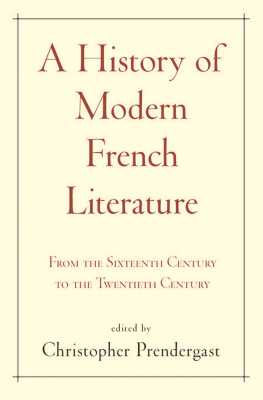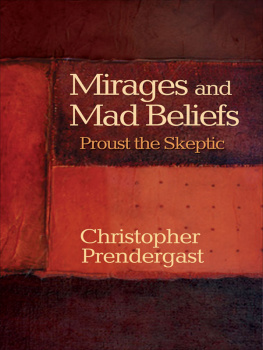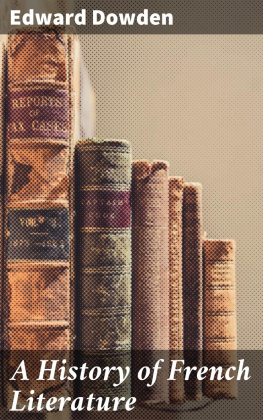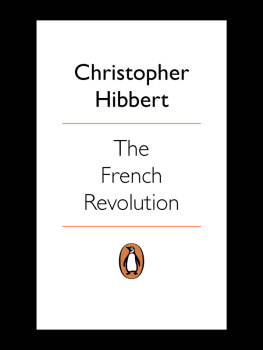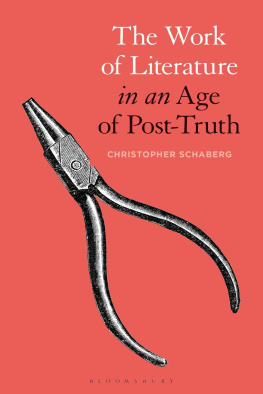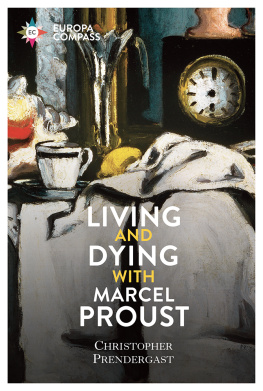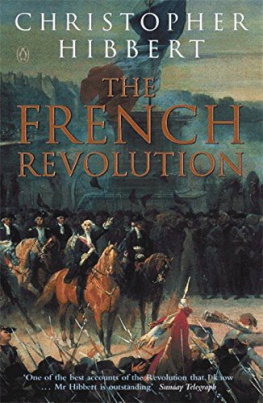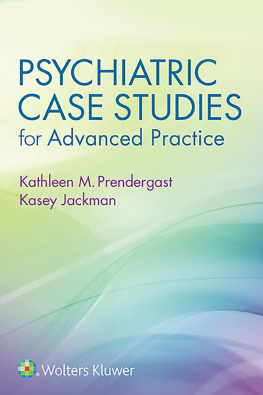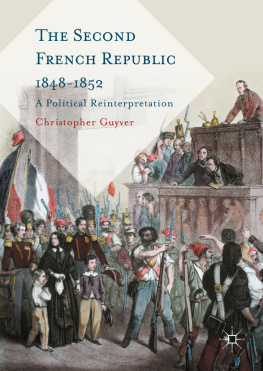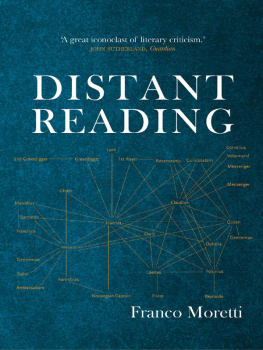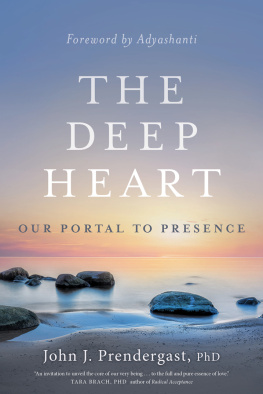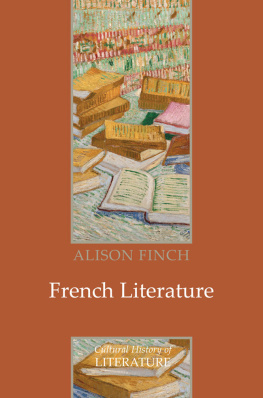Prendergast Christopher - A History of Modern French Literature
Here you can read online Prendergast Christopher - A History of Modern French Literature full text of the book (entire story) in english for free. Download pdf and epub, get meaning, cover and reviews about this ebook. year: 2017, publisher: Princeton University Press, genre: Romance novel. Description of the work, (preface) as well as reviews are available. Best literature library LitArk.com created for fans of good reading and offers a wide selection of genres:
Romance novel
Science fiction
Adventure
Detective
Science
History
Home and family
Prose
Art
Politics
Computer
Non-fiction
Religion
Business
Children
Humor
Choose a favorite category and find really read worthwhile books. Enjoy immersion in the world of imagination, feel the emotions of the characters or learn something new for yourself, make an fascinating discovery.
- Book:A History of Modern French Literature
- Author:
- Publisher:Princeton University Press
- Genre:
- Year:2017
- Rating:4 / 5
- Favourites:Add to favourites
- Your mark:
- 80
- 1
- 2
- 3
- 4
- 5
A History of Modern French Literature: summary, description and annotation
We offer to read an annotation, description, summary or preface (depends on what the author of the book "A History of Modern French Literature" wrote himself). If you haven't found the necessary information about the book — write in the comments, we will try to find it.
A History of Modern French Literature — read online for free the complete book (whole text) full work
Below is the text of the book, divided by pages. System saving the place of the last page read, allows you to conveniently read the book "A History of Modern French Literature" online for free, without having to search again every time where you left off. Put a bookmark, and you can go to the page where you finished reading at any time.
Font size:
Interval:
Bookmark:

A History of Modern French Literature
A History of Modern French Literature
FROM THE SIXTEENTH CENTURY TO THE TWENTIETH CENTURY
Edited by Christopher Prendergast
Princeton University Press
Princeton & Oxford
Copyright 2017 by Princeton University Press
Published by Princeton University Press, 41 William Street, Princeton, New Jersey 08540
In the United Kingdom: Princeton University Press, 6 Oxford Street, Woodstock, Oxfordshire OX20 1TR
press.princeton.edu
All Rights Reserved
Library of Congress Cataloging-in-Publication Data
Names: Prendergast, Christopher, editor.
Title: A history of modern French literature : from the sixteenth century to the twentieth century / edited by Christopher Prendergast.
Description: Princeton, New Jersey : Princeton University Press, 2016. | Includes index.
Identifiers: LCCN 2016009876 | ISBN 9780691157726 (hardcover : alk. paper)
Subjects: LCSH: French literatureHistory and criticism.
Classification: LCC PQ103 .H57 2016 | DDC 840.9dc23 LC record available at https://lccn.loc.gov/2016009876
British Library Cataloging-in-Publication Data is available
This book has been composed in Janson Text LT Std
Printed on acid-free paper.
Printed in the United States of America
10 9 8 7 6 5 4 3 2 1
CONTENTS
CHRISTOPHER PRENDERGAST
DAVID COWARD
EDWIN M. DUVAL
RAYMOND GEUSS
WES WILLIAMS
TIMOTHY J. REISS
HASSAN MELEHY
TIMOTHY HAMPTON
CHRISTOPHER BRAIDER
NICHOLAS PAIGE
KATHERINE IBBETT
ERIC MCHOULAN
JUDITH SRIBNAI
LARRY F. NORMAN
NICHOLAS CRONK
PIERRE SAINT-AMAND
CATRIONA SETH
SUSAN MASLAN
KATE E. TUNSTALL
JOANNA STALNAKER
ALEKSANDAR STEVI
SARAH ROCHEVILLE AND ETIENNE BEAULIEU
PETER BROOKS
CLIVE SCOTT
ROGER PEARSON
MICHAEL LUCEY
STEVEN UNGAR
MARY ANN CAWS
MARY GALLAGHER
CHRISTOPHER PRENDERGAST
JEAN-MICHEL RABAT
NICHOLAS HARRISON
CONTRIBUTORS
Etienne Beaulieu, Cgep de Drummondville, Canada
Christopher Braider, University of ColoradoBoulder
Peter Brooks, Princeton University
Mary Ann Caws, City University of New York Graduate Center
David Coward, University of Leeds
Nicholas Cronk, University of Oxford
Edwin M. Duval, Yale University
Mary Gallagher, University College Dublin
Raymond Geuss, Cambridge University
Timothy Hampton, University of CaliforniaBerkeley
Nicholas Harrison, Kings College London
Katherine Ibbett, University College, London
Michael Lucey, University of CaliforniaBerkeley
Susan Maslan, University of CaliforniaBerkeley
Eric Mchoulan, Universit de Montral
Hassan Melehy, University of North Carolina
Larry F. Norman, University of Chicago
Nicholas Paige, University of CaliforniaBerkeley
Roger Pearson, University of Oxford
Christopher Prendergast, Kings College, Cambridge
Jean-Michel Rabat, University of Pennsylvania
Timothy J. Reiss, New York University
Sarah Rocheville, University of Sherbrooke, Canada
Pierre Saint-Amand, Yale University
Clive Scott, University of East Anglia
Catriona Seth, University of Oxford
Judith Sribnai, Universit du Qubec Montral
Joanna Stalnaker, Columbia University
Aleksandar Stevi, Kings College, Cambridge
Kate E. Tunstall, University of Oxford
Steven Ungar, University of Iowa
Wes Williams, University of Oxford

Introduction (1)
Aims, Methods, Stories
CHRISTOPHER PRENDERGAST
All the main terms of our title call for some clarification (history, modern, French, literature), and the introductory chapter that follows this one, by David Coward, is in part devoted to providing that. But, in explaining the basic aims of the book, it is also important to highlight what might otherwise go unnoticed, the normally anodyne indefinite article; it is in fact meant to do quite a lot of indicative work. The initial a has a dual purpose. It is designed, first, to avoid the imperiousness of the definite article and thus to mark the fact this is but a history, modestly taking its place as just one among many other English-language histories, with no claim whatsoever on being definitive; on the contrary, it is highly selective in its choice of authors and texts, and very specific in its mode of address. This in turn connects with a second purpose: the indefinite article is also meant to highlight a history that is primarily intended for a particular readership. In the sphere of scholarly publication, the general reader (or common reader, in the term made famous by Dr. Johnson in the eighteenth century and Virginia Woolf in the twentieth) is often invoked, but less often actually or effectively addressed. We take the term seriously, while of course remaining cognizant of the fact that conditions of readership and reading have changed hugely since Virginia Woolfs time, let alone Dr. Johnsons. While we naturally hope the book will prove useful in the more specialized worlds of study inhabited by the student and the teacher, the readers we principally envision are those with an active but nonspecialist interest in French literature, whether read in the original or in translation, and on a spectrum from the sustained to the sporadic (one version of Woolfs common reader is someone guided by whatever odds or ends he can come by, a nontrivial category when one bears in mind that a collection of Samuel Beckett texts goes under the title of Ends and Odds).
This has various consequences for the books character as a history. The first concerns what it does not attempt: what is often referred to, unappetizingly, as coverage, the panoramic view that sweeps across centuries in the attempt to say something about everything. We too sweep across centuries (five of them), but more in the form of picking out selected landmarks, to resurrect the term used by Virginia Woolfs contemporary, Lytton Strachey, in his Landmarks of French Literature, a book also written for the general reader, if from within the conditions and assumptions of another time and another world. One point of departure adopted for the direction of travel has been to work out from what is most likely to be familiar to our readership. There are dangers as well as advantages to this trajectory. The familiar will be for the most part what is historically closest, which in turn can color interests and expectations in ways that distort understanding of what is not close. One name for this is presentism, whereby we read history backward, approaching the past through the frame of the present or the more distant past through the frame of the recent past. In some respects, this is inevitable, a natural feature of the culture of reading, and in some cases it is even enabling as a check to imaginative inertia (what in his essay Tradition and the Individual Talent, T. S. Eliot described as the desirable practice of interpreting a past writer from a point of view that will not find it preposterous that the past should be altered by the present as much as the present is directed by the past). Eliots contemporary, Paul Valry famously claimed that a reader in 1912 taking pleasure in a work from 1612 is very largely a matter of chance, but one obvious source of the pleasure we take in the remoter past is viewing it through our own cultural spectacles (Valry reading 1612 via his own historical location in 1912, for instance). The risk, however, is the loss of the historical sense as that which demands that we try to understand and appreciate the past (here the literary past) on its terms rather than our own, while remaining aware that we can never fully see the past from the point of view of the past. On the other hand, if the past is another country, it is not another planet, nor are its literary and other idioms, for us, an unintelligible babble. One of the implicit invitations of this book is for the reader to use the familiar as a steering device for journeys to places unknown or underexplored, while not confusing the ships wheel with the design of the ship itself or the nature of the places to which it takes us. Indeed the literature itself provides examples and models for just this approach, most notably the genre of travel writing, both documentary and fictional, from the Renaissance onward, a complex literary phenomenon at once freighted with the preconceptions (and prejudices) of the society in which it is produced, but also often urging its readers to try to see other cultures through other, indigenous, eyes (think Montaignes essay, Des Cannibales or Diderots
Next pageFont size:
Interval:
Bookmark:
Similar books «A History of Modern French Literature»
Look at similar books to A History of Modern French Literature. We have selected literature similar in name and meaning in the hope of providing readers with more options to find new, interesting, not yet read works.
Discussion, reviews of the book A History of Modern French Literature and just readers' own opinions. Leave your comments, write what you think about the work, its meaning or the main characters. Specify what exactly you liked and what you didn't like, and why you think so.

